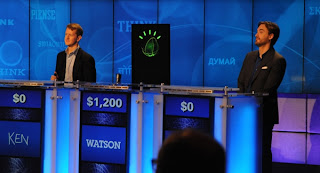I remember having a visceral, emotional attachment to following (in the paper, at the dawn of the Internet in 1996) the chess match between Gary Kasparov and “Deep Blue” – the IBM computer chess program that was designed to play him. I was ecstatic when Kasparov first beat it in ’96. It seemed to confirm something essential, and special, about humanity, for me. (It inspired me to start a short-story that I never finished that lies among my old papers somewhere). I was crushed when he lost 2 games to 1, with three draws in a 6 game rematch in 1997. Kasparov claimed Deep Blue cheated, demanded a rematch, and the computer was disassembled by IBM and that ended the matter.
 |
| Deep Blue |
Recently, Ken Jennings, the Jeopardy champ who was all but unbeatable (he won 74 times in a row), and another Jeopardy champ, Brad Rutter (who beat Jennings in a Jeopardy Tournament of Champions), took on a computer named Watson in a three-day match.
The issue for computer designers was the computer’s ability to understand the human (English) language. Anyone who has watched Jeopardy knows that contestants are given answers and then must come up with the “question” – and that the categories frequently involve puns, wordplay, and matters of pop culture and other common knowledge. Designing a computer to “understand” these oblique references is an incredible challenge and approaches the barrier to “strong AI” or “artificial general intelligence” – something Kurzweil and other computer programmers and designers have been studying and trying to tackle for years.
Watson soundly kicked both Jennings’ and Rutter’s human asses. Jennings wrote below his Final Jeopardy answer – “I for one welcome our new computer overlords,” a humorous reference to a Simpsons’ episode. The final scores? Watson – $77,147; Jennings – $24,000; Rutter – $21,600. Ken Jennings’ post-Watson tail-kicking article for “Slate” magazine is absolutely (and not surprisingly) brilliant. It is a must read – here – on the exact subject that I’m blathering about. He quips, somewhat dryly, at the end of the article: “I understood then why the engineers wanted to beat me so badly: To them, I wasn’t the good guy, playing for the human race. That was Watson’s role, as a symbol and product of human innovation and ingenuity. So my defeat at the hands of a machine has a happy ending, after all. At least until the whole system becomes sentient and figures out the nuclear launch codes. But I figure that’s years away.” Jennings gets what may be at stake in the world of AI. He notes, just a few paragraphs from that end that “Quiz show contestant may be the first job made redundant by Watson, but I’m sure it won’t be the last.” Worth noting is that Watson took up the size of about 10 refrigerators in a room below the studio where the questions were being asked and Watson’s avatar sat, much like the computers used to launch man into space in 1969. I wonder how long it is before Watson’s capacity will fit into something the size of my laptop…?
Okay, so why should we assume that the burgeoning artificial intelligence won’t produce the end of all disease? The conquering of death itself (as Kurzweil hypothesizes in the Time article with advances in telemerase, an enzyme that appears to reverse the damage to DNA strands that underlies aging)? A solution to interstellar and time-travel? Or a benevolent computer God, who/which would ensure no harm ever came to another person again? And again – what the fuck does this have to do with Aristotle…?
 |
| Aristotle |
Part, The Last, coming up…

